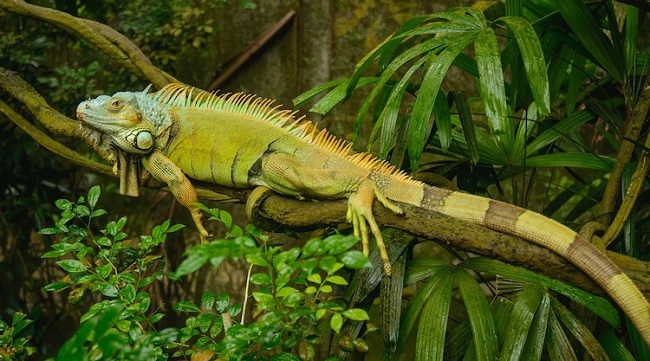Iguanas are one of the most popular reptiles chosen by pet enthusiasts. Yet, many potential Iguana owners don’t realize the commitment they are getting into – these fascinating creatures can grow quite large, reaching sizes that demand ample space and special care.
In this in-depth article, we delve into the world of Full Grown Iguanas, highlighting their sizes and the considerations to bear in mind when caring for these magnificent reptiles.

What is The Size of Full Grown Iguanas?
The size of a Full Grown Iguana can vary significantly depending on the species. Two of the most common species kept as pets are the Green Iguana and the Blue Iguana.
Green Iguana
Green Iguanas (Iguana Iguana) are among the largest Iguana species. Male Green Iguanas, when Fully matured, can reach lengths of 6 to 7 feet from nose to tail, with females being somewhat smaller, usually around 5 feet long. A significant portion of their length is attributed to their long, whip-like tail.
Blue Iguana
The Blue Iguana (Cyclura lewisi), also known as the Grand Cayman Iguana, is another large species. Full Grown males can grow to be more than 5 feet long, while females usually measure around 3 to 4 feet.
Caring for Full Grown Iguanas
Caring for a Full Grown Iguana requires space and dedication. Due to their size, Iguanas need large, secure enclosures. As a general rule, an Iguana’s cage should be at least twice as long and twice as wide as the Iguana’s total length, and as tall as the Iguana is long.
Apart from enclosure size, the following aspects are also crucial for their care:
Diet: Iguanas are primarily herbivorous. A diet rich in dark, leafy greens and other vegetables is essential for their health.
Temperature: Iguanas need a warm environment, with basking areas reaching temperatures of 95 to 100 degrees Fahrenheit.
Health: Regular vet check-ups are necessary to monitor for common health problems like metabolic bone disease and parasites.
Challenges and Considerations
The large size of Full Grown Iguanas often means that they are not the best choice for everyone. They require substantial space and a dedicated owner prepared to handle their long-term care needs.
Additionally, their powerful, whip-like tails can cause injury if not handled correctly. Iguanas also have strict dietary and habitat requirements that need to be met for them to thrive.
Understanding Iguana Lifespan
To Fully understand the commitment of caring for an Iguana, one should consider not only their size but also their lifespan. On average, Green Iguanas live between 10 to 15 years in captivity, but with optimal care, they can live up to 20 years or more.
Blue Iguanas can live even longer, with an average lifespan of 25 years in the wild, and potentially more in captivity.
Socialization and Behavior of Iguanas
Iguanas are solitary creatures in the wild, which means they do not necessarily crave companionship as dogs or cats might. They can, however, become accustomed to their caregivers’ presence, responding positively to gentle handling and interaction.
Unlike many mammalian pets, Iguanas communicate largely through visual signals. Understanding these can go a long way in building a harmonious relationship with your Iguana. For instance, head bobbing is a common behavior, often used to assert dominance or show excitement.
Iguana Conservation Status
Many Iguana species are facing threats due to habitat loss, hunting, and the pet trade. The Blue Iguana is a particularly notable example. Once listed as critically endangered, dedicated conservation efforts on the Cayman Islands have helped to increase its population.
Those considering an Iguana as a pet should ensure they source their reptile responsibly. Adopting an Iguana from a rescue center or purchasing from a reputable breeder who can verify the animal was bred in captivity, not taken from the wild, is recommended.
Conclusion
Full Grown Iguanas are truly a sight to behold, with their impressive size and majestic presence. However, it’s crucial to understand their care needs before committing to bring one into your home.
Given the proper care and environment, these magnificent creatures can serve as an exciting and fulfilling pet for the right owner. With their potential size in mind, a Full Grown Iguana can be a large but rewarding responsibility.
























